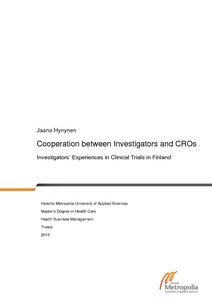Cooperation between Investigators and CROs : Investigators' Experiences in Clinical Trials in Finland
Hynynen, Jaana (2015)
Hynynen, Jaana
Metropolia Ammattikorkeakoulu
2015
All rights reserved
Julkaisun pysyvä osoite on
https://urn.fi/URN:NBN:fi:amk-201505086968
https://urn.fi/URN:NBN:fi:amk-201505086968
Tiivistelmä
Drug development is a long-lasting, complex, expensive and highly regulated process. International ethical and scientific quality standard "Good Clinical Practice" (GCP) defines roles and responsibilities of sponsors and investigators conducting clinical trials. Sponsor may transfer trial-related duties and functions to Contract Research Organizations (CROs). Outsourcing clinical trials to CROs has been growing trend since 1980s and outsourcing is estimated to continue in the future. Cooperation between sponsors and CROs is followed in yearly surveys, but there are only few studies about cooperation between investigators and CROs.
The purpose of this qualitative research is to increase knowledge about cooperation between Investigators and CROs. Aim is to describe how investigators are experiencing cooperation with CROs by finding out what kind of positive and negative experiences investigators have in cooperation between investigators and CROs. Data was collected from in-depth interviews of six physicians who had over five year experience in the field of clinical trials and had experience in cooperation with CROs. Data was analyzed by using conventional content analysis.
Results showed that investigators had positive experiences especially in cooperation with trial monitor (CRA). Positive experiences were related to situations where CRA was working together with trial site personnel, CRA was qualified and CRA was working in businesslike manner. Negative experiences related to cooperation with CRA were related to situations where CRA's working methods were not satisfactory and site was left alone with increased workload. Investigators also reported experiences that were related to CRO's position and operational environment. Experiences were related to situations where CRO was using sites to get profit, CRO-sponsor contract caused difficulties, CRO's working methods were not satisfactory and how operational environment influences in cooperation.
Results of this research increase knowledge about cooperation in clinical trial field. Results help to identify development needs in cooperation between investigators and CROs and these can be used to improve procedures related to investigator – CRO cooperation.
The purpose of this qualitative research is to increase knowledge about cooperation between Investigators and CROs. Aim is to describe how investigators are experiencing cooperation with CROs by finding out what kind of positive and negative experiences investigators have in cooperation between investigators and CROs. Data was collected from in-depth interviews of six physicians who had over five year experience in the field of clinical trials and had experience in cooperation with CROs. Data was analyzed by using conventional content analysis.
Results showed that investigators had positive experiences especially in cooperation with trial monitor (CRA). Positive experiences were related to situations where CRA was working together with trial site personnel, CRA was qualified and CRA was working in businesslike manner. Negative experiences related to cooperation with CRA were related to situations where CRA's working methods were not satisfactory and site was left alone with increased workload. Investigators also reported experiences that were related to CRO's position and operational environment. Experiences were related to situations where CRO was using sites to get profit, CRO-sponsor contract caused difficulties, CRO's working methods were not satisfactory and how operational environment influences in cooperation.
Results of this research increase knowledge about cooperation in clinical trial field. Results help to identify development needs in cooperation between investigators and CROs and these can be used to improve procedures related to investigator – CRO cooperation.
